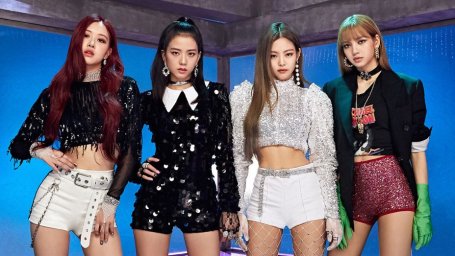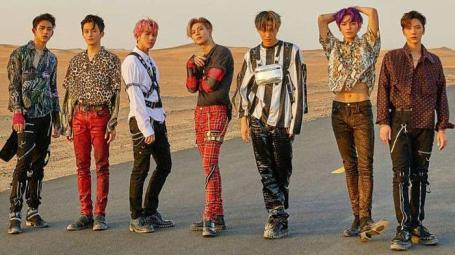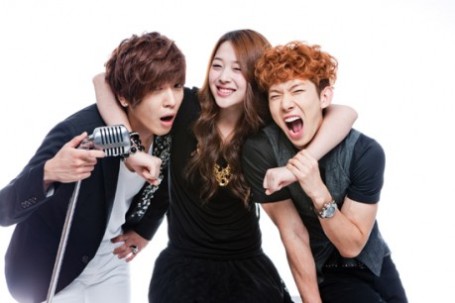Stars Falling From The Sky: Sulli, Hara, and Compressed Modernity
November 25, 2019 at 7:29 am 3 comments

Goo Hara, 2019
NOTE: I started writing this a few weeks ago but didn’t get around to finishing it. Sadly, it’s become relevant again as another Kpop star, Goo Hara, took her life yesterday at the age of 28. I’m now posting this updated version.
On Oct. 14, 2019, Kpop superstar Sulli died by her own hand, bringing into focus the troubles often faced by young performers in a high-pressure industry. She was 25 when she died and had been working in the South Korean entertainment business for more than ten years, debuting in 2008 at age 14 as a teen actor. Soon thereafter she joined the girl group f(x), which was one of the most popular Kpop groups of its era.
Like her fellow Kpop star Kim Jonghyun, who committed suicide in December 2017, Sulli suffered from clinical depression. But perhaps a more pressing factor in her death was the constant cyberbullying she endured for much of her career. She didn’t fit into the mold of the demure, proper South Korean female and she was mercilessly raked over the coals by an unforgiving Korean press and public for her every move. This along with her fragile mental health without a doubt contributed to her decision to end her life.
This highlights the troubling dark side of fandoms in South Korea and around the world. Female celebrities in particular suffer from slut shaming, body shaming, and general hatred and derision in the internet age as anonymous keyboard warriors gang up and exacerbate a mob mentality, playing judge and jury to anyone they deem guilty of transgressing or offending their sensibilities.
Although Western stars such as Taylor Swift, Rihanna, and Miley Cyrus have come under scrutiny for their various romantic misadventures, they haven’t suffered the same accusations of impropriety as have Kpop idols. This is in part because the private lives of South Korean pop stars are much more strictly controlled and regulated. Some idols, including girl group Blackpink, who made a splash at Coachella this year, have no-dating clauses written into their contracts (Blackpink’s ban expired in 2019). Many fans also uphold this standard, often insisting that their favorite idols remain single (although many date in private) so as not to disturb the fantasy of their availability as romantic partners.
But another unpleasant aspect of the idol life is a direct result of the neoliberal competition that is consuming the entertainment world, especially in South Korea. As I’ve noted in the past, idol groups regularly compete for trophies on popular weekly music programs for their newest single releases. These shows pit each group against each other in what are basically popularity contests, with winners determined by youtube and other online streaming numbers, live voting, and other metrics that have little to do with quality and everything to do with quantity. Groups with the biggest and most active fandoms win and those with smaller followings lose, full stop. This has recently translated over to the US, with the wildly popular group BTS originally gaining traction in the west by winning the Billboard social media award back in 2017, which was based on the number of mentions on twitter and other platforms. From there BTS has built up a vast following that has pushed the group to great popularity around the world. Whether or not their music actually warrants this I won’t say, but their success has led to other South Korean groups attempting similarly splashy debuts in the US.
On Oct. 13 the Kpop group SuperM’s first album debuted at number one on the Billboard Hot 200. However, detractors have noted that the sales for the album may have been artificially inflated by several tactics by the group’s labels, SM Entertainment and Capital Records. These include bundling the album with concert ticket sales and funneling all sales worldwide through US distributors, defying Billboard’s regulations that state that only US sales count toward its charts. This is borne out by the fact that SuperM’s album did not chart on Spotify or iTunes, suggesting that the Hot 200 number one was unfairly manipulated.
As the New York Times notes,
“The (Super M) CD version came in eight packaging variations, one for each member of the group (plus a “united” version), which included a variety of posters and collectible cards. The group’s fans took to social media to display the many versions they acquired.
“The 1st Mini Album” was also available as part of more than 60 sales bundles for merchandise and concert tickets, which featured items like T-shirts enabled with augmented reality: point a smartphone at the shirt using a special app, and the SuperM member pictured on it becomes animated. Tactics like these have become increasingly common, but also raised concerns in the industry about distorting the weekly charts”
But Super M didn’t invent bundling. As the NY Times further observes. “Taylor Swift offered four deluxe versions of her album “Lover” at Target stores, while the metal band Tool sold 88,000 CDs in its first week as part of a $45 foldout package that included a four-inch HD video screen.”

Zero sum game, Sulli
Whatever the truth may be, the excessive focus on quantity as the determinant of success is a contributing factor to the online bullying and harassment that many fans practice. Kpop fans regularly participate in vicious fanwars, tearing down perceived competitors who they see as threats to their idols’ success. Sulli and others may have been caught in the crossfire of this excessive zero sum game attitude, as fans believe that their favorites can only succeed at the expense of the failure of their rivals. It’s an ugly and unpleasant mentality that is a direct result of neoliberalism and global capitalism, which privileges measurable commercial success rather than more ephemeral and subjective metrics such as artistic achievement and appeal.
It’s also a result of what Chang Kyung-Sup calls compressed modernity, or the rapid-fire pace of modernization that South Korea has experienced in the past 50 years. Chang notes, “Compressed modernity is a civilizational condition in which economic, political, social and/or cultural changes occur in an extremely condensed manner.” These changes often cause great stresses in a society and in individuals that may account for the dysfunctional bullying of Sulli and others who are perceived as operating outside of societal norms. Goo Hara was also the victim of slut-shaming and cyberbullying resulting in part from a vindictive campaign by an ex-boyfriend who threatened to release sex videos of the star that he had recorded without her permission. She had also been targeted earlier by the South Korean media for her dating history, which in Kpop idol world is verboten. Yet these are all results of South Korea’s compressed modernity, a result of the highly stressful effects of the country’s rapid economic rise in the past fifty years.
So although many Western observers like to claim that South Korean culture and society is to blame for the deaths of these young stars, in fact the root causes are globally endemic. It’s easy to point the finger at South Korean society, or at Kpop, or at Korean fans or netizens, but these are only symptoms of a much more widespread malaise, a worldwide neoliberal economic system in which hypercompetitiveness pits us all against each other and in which individual achievement is valued over empathy, compassion, or collective well-being. Sulli, Hara, and many others are simply victims caught up in the vicious and exploitative cogs of this system.
NOTE: This is the fifth person in three years that Jung Yonghwa has personally known or worked with who has committed suicide. Yonghwa knew Kim Jonghyun as a fellow second-generation Kpop star and in 2015 both Jonghyun and Yonghwa had successful solo debuts. In 2009 Yonghwa co-starred with Hara on the reality show Korea Ecosystem Rescue Centre: Hunters. In 2011 Yonghwa co-hosted the music show Inkigayo with Sulli. In 2014 Yonghwa worked with actor Kim Sung-min on the K-drama The Three Musketeers. Kim later committed suicide in 2016. And in 2016 Chinese actor and singer Qiao Renliang killed himself, in part because of cyberbullying. Qiao had attended a CNBLUE concert in 2013 and was a fan of the band, and after his death Yonghwa posted a shocked notification on his weibo. Being personally touched so many times by suicide can’t be good, and speaks to the ripples of trauma that these tragedies create. Despite their seemingly charmed lives this demonstrates the great stress popular entertainers such as Yonghwa are under.
Entry filed under: goo hara, sulli, super m, yonghwa. Tags: CNBLUE, goo hara, Kpop, South Korea, sulli, yonghwa.
3 Comments Add your own
Leave a comment
Trackback this post | Subscribe to the comments via RSS Feed





1. Dr.K. Bangtanism | January 12, 2020 at 8:58 pm
Dr.K. Bangtanism | January 12, 2020 at 8:58 pm
I’m happy to see others writing about KPOP. Why not make a stop at my site for some more content. Thanks!
2. valeriesoe | January 13, 2020 at 10:47 pm
valeriesoe | January 13, 2020 at 10:47 pm
Thanks so much, I’ll have a look. Though for Korean artists I really only follow CNBLUE and their music–BTS and other Kpop acts are not really my cup of tea. But I appreciate the comment!
3. Dr.K. Bangtanism | January 14, 2020 at 12:50 am
Dr.K. Bangtanism | January 14, 2020 at 12:50 am
Thanks for writing back. I’m a former university professor using my academic background to examine BTS’ impact. So I often write about KPOP in general. Those are the posts I thought you might find interesting. Check out the latest “What is KPOP” It’s a wee bit controversial. Fun!